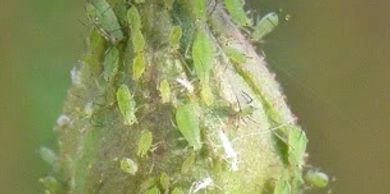Pests
Aphids

Aphids also called plant lice are very small insects about 1/16 to 1/8 inch long, usually light green but they can also be brown red or black. They appear seemingly out of nowhere in the spring and feed and damage new tender growth sucking juices from the leaf and stem. Severe infestations will cause the leaf to curl and die. As they feed they excrete a sticky honeydew like substance that is attractive to ants. After a period of time this honeydew substance turns to a sooty black mold. Treatment can be made by washing them off with soap and water, introducing lady bugs or chemical treatment with specific insecticides.
Japanese Beetles

Japanese beetles are shiny cooper and green beetles about 1/4 inch long. They are the adult instar of the grub that infects your lawn and grass. Beetles usually emerge the last week in June and usually with us the month of July before they return to the ground to feast on your lawn. Japanese Beetles love roses and do extensive damage to the flower, bud and leaves. Use of beetle traps attract beetles to your yard for up to one mile away and should be avoided. Picking off beetles is one method of control. Cutting flowers and enjoying them inside is a way to enjoy your roses without damage from beetles. Chemical control can also be applied to kill beetles.
Rose Midge
Rose Midge

This pest is from a family of midges that cause plant galls. It is important to understand the lift cycle of this insect to establish control. the adult rose midge is similar in size to a mosquito. The adult only lives one to two days. It lays its eggs in the bud and new growth area of the rose. The eggs take 2 days to hatch and turn into larvae, about the size of a sesame seed, which bury themselves into the new formed leaf shoots and buds and then begin feeding on the epidermal tissues. The damage from this feeding causes girdling of the new shoots and buds causing them to not form or open properly. This results in a wilted leaf of blind shoot. It eventually falls off resulting in no flowers. the larvae usually live and feed for 5-10 days before they drop to the ground under the bush. Once on the ground they will form a cocoon and pupate for 5-7 days before reemerging as an adult midge. Treatment requires treating the bush and ground with systemic insecticides. Timing is very important in the control of this insect.
Rose Slugs
Spider Mites
Rose Midge

Rose slugs are the larva of the saw fly. They feed from May-September for 2-3 weeks when they are in the larva stage. Rose slugs are found on the underside of the leaf. They create random holes as they feed. Treatment consists of application of the appropriate insecticide during the feeding season.
Spider Mites
Spider Mites
Spider Mites

Two spotted Spider Mites usually become active during hot dry periods of the summer. They are very small, feed on the underside of the leaf and sometimes make small webs. You will begin to notice a dull appearance to the leaf. The underside will feel rough or sandy. Leaves will begin to loose their color and become dry and lifeless. The leaves soon die and drop off. Control for spider mite must be varied because mite develop resistance to the same miticide. The use of an ovicide also helps kill and control the egg
Deer
Spider Mites
Spider Mites

If you have deer in your neighborhood they will find your roses and dine on the buds, flowers, and foliage. The best method of control is a perimeter deer fence. We have had excellent control installing electric fences enclosing the rose garden. Repellent sprays provide some control but are not a guarantee for controlling browsing. We can install electric fences to provide the control you need. We also offer repellent sprays.